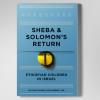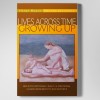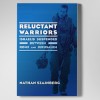“In War, Fathers bury their sons”
–Herodotus
There are too many memorial sites for dead soldiers in Israel. I stop at one, as I drive north during the Second Lebanese War. At a vista overlooking the now-bombed-out, smoldering brow of the Benjamin Hills bordering Lebanon, I press a button for an audio tour about this dead soldier and his unit. The first words I hear: the boy’s voice, his cell phone message; if you leave your number, he flatly insists, he’ll call you back. He no longer responds.
Listen instead to David Grossman’s tale from the edge of space to the end of time; from his books “To The End of the Land” to “Falling out of Time.” Listen and we may learn more (from a poet of the soul) about Freud’s insistence that at the end of mourning (work), the ego becomes free and uninhibited.
But, you may decide rightly not to take this voyage. You can turn back. Grossman can no longer.
Grossman did not want to be known as one who wrote a book hinting at a son’s death. He began “To the End of the Land” several years before his son was killed on the last day in the last hours of the Lebanese War, even as this father was protesting the War.
His son, Uri (“My Light”) would ask over the three years before death how the story was going. Then, he is dead. And in some manner, Grossman finishes this book about a mother’s ventures to the edges of the land. (This Land, which, Freud wrote to Zweig, is so odd: it has spawned no great science nor art, but three illusions — Judaism, Christianity, Islam. This Land, Freud concluded, deserves further study. This Land for which too many have died.) Let’s use this novel, this work of art from the Land, to follow Freud’s advice; see what we can learn about that Land, about ourselves. Here, I will not review “To the End,” only select some thoughts on mourning for us.
Grossman writes “To the End” mostly in a woman’s voice, Ora’s (“Light”). Briefly, her son, Ofer, having finished his obligatory army service, hears that his unit is called up to fight in Lebanon. Surreptitiously from his bedroom, Ofer (“Deer”) telephones his unit; asks them to call him back into service so he can join them. Then, he comes downstairs to tell his mother — whose husband and younger son have recently left her — that Ofer has been called up for the war. She suspects correctly his ruse.
Nip just one moment from early in the book: Ora rides a cab to take Ofer to the border. Not far in Israel. (Nothing’s too far.) There, surrounded by TV cameras, buddies, buses of uniformed young men, and the tumult and smoke of war along the horizon and closer, Ofer embraces his mother twice. The second time, as the TV camera man tries to eavesdrop on them, Ofer whispers into her ear. Then, he turns to smile, wave at the camera and leaves. Ora stands stunned, speechless; the newsman demands to know what he whispered. She tells us only much later.
But, Ora makes a deal with herself; this drives the book. She knows that should Ofer be killed, two officers (of a special unit) will find her to deliver the news. She makes a deal, plays her own Mephistopheles: If she is not findable — if she can disappear from home, from phones, from newspapers, from radios — then, well, then they can’t find her and … nothing can happen to Ofer.
The rest of the book is of her journey through the fringes of Israel’s northern hills with a soul-ravaged man, who two decades earlier, after being kidnapped and bestially tortured by the Egyptians, is now brain-singed, barely functioning, Avram. Avram is Ofer’s father.
They skirt civilization — papers, radios, cell phones. She rebuilds some of his humanity. The book ends coyly. We do not know what happens to Ofer.
We do know of Uri, Grossman’s son.
And the words Ofer whispered to his mother before he turned to leave, smiling and waving broadly for the news cameras? Into her ear, he leaves these words: if I don’t come back, if something happens to me, leave this country. There is nothing left for you here.
During the long hike, Ora tells Avram, who has avoided seeing Ofer, about his life, his growth, his character. At the end, at the End of the Land, she reveals her stratagem to Avram and us:
“…I thought that if we both talked about him, if we kept talking about him, we’d protect him, together, right?”
Grossman’s epilogue also reveals his unsuccessful stratagem. “I had the feeling — or rather, a wish — that the book I was writing would protect him.”
Freud’s “Mourning and Melancholia” stands on its own; we needn’t know that he worked- through his thoughts during the early years of World War I, as he watched the wholesale slaughter of a generation of young man. But, we do know that this deeply thoughtful man was affected not only by what he heard in his consulting room, but also what he absorbed from his era.
So too, “To the End of the Land” will stand alone, I believe, as you read it. It is a book that I had to put down often: first, it evokes harsh feelings (as Aristotle demanded of fine art); second, I realized that I had developed the thought, more the fantasy, that if I didn’t finish reading the book, Uri would not die.
But, I also read it while living in Israel. I read it after going north during the Lebanese War both to visit soldiers whom I’d interviewed for my “Reluctant Warriors” book and to volunteer as a physician in Kiryat Shemona, that small city near the finger tip sticking into enemy territory. As I read Grossman, I remember approaching the junction to Kiryat Shemona in my rented Hyundai Getz (a sardine can with an engine) and feeling it buffeted sideways. First, I was surprised: I hadn’t recalled such side winds here. Then, I realzed that I was being shaken by Hezbollah bombs from Lebanon. I saw the Jewish National Forest trees transformed into charred, smoking stumps. I felt some relief that I would be protected from shrapnel by the car. But when, I entered the town , I saw a car hulk with a missle through its back window; others that were reduced to sieves, giant collanders by shrapnel. I quickly found the bomb-sheltered Emergency Room to report for duty.
One of my soldiers, a published poet, Eliaz Cohen, told me this after the war. This people are healthy; the government, the army who command are ill. The people absorbed one million refugees from the North of Israel; into homes, apartments; into schools. The people, the soldiers with boots on the ground, were ready to protect their families, their neighbors from rockets. But, what soldiers told me of this longest of Israeli wars was how frustratingly badly it was run by Central Command. Elite units, dropped into enemy territory for 72 hours, were told first to attack that hill, then not; this hill, then not; then told to take refuge in a house, which made them targets for Hezbollah
artillery. My first funeral was for Ro’i (“My Shepherd”), recently married, who had fallen onto a grenade to save his buddies. His buddies, tough, broad-shouldered stood around the grave, (and around Ro’i’s widow as she fainted); their sunglasses could not hide the tears streaming down cheeks. I won’t write more here about military matters or the politics that resulted in having a Defense Minister, a former labor union organizer, who had never served as a military officer, but got his position because he got enough votes. Or a Prime Minister who was better at getting indicted for financial dealings, better at getting coalitions for power, than he was at governing. I am a psychoanalyst; no expertise in such matters.
I was bathed in this milieu as I read Grossman’s book; then, read it later again.
Freud insists that with the work of mourning — and it is hard labor — the ego can eventually become free and uninhibited again. But, can the ego become uninhabited?
Anna Orenstein spoke so poignantly in her plenary, of the deaths in the concentration camps; it may take time to begin to mourn, particularly without proper goodbyes.
Ironically, Grossman with his recent book may elaborate on Freud ‘s idea on the work of mourning. That the act of writing, of recounting, of entering or creating a fantasy world may (just may) help us accept the external reality of death. But, as Herodotus says bluntly, war reverses the tide of mankind: fathers bury their sons.
Imagine for a moment that some Hezboll-ish Mephistopheles had come to Grossman before the Lebanon war and offered a deal: write no book and Uri will live. From Grossman’s sentiments, we know he would have taken the deal. We would not have these two books, but Grossman would have his Uri, his light.
But, there was no such deal. We have Grossman’s writing and heartfelt, heartbreaking thinking. It is up to us to learn something about the Land that creates such writing, such people and possibly to learn more about our potential capacities should we have to mourn. Or better yet, how can we (psychoanalysts and colleagues) protect ourselves from mourning our sons and daughters by preventing the wars that consume them, that reverse life’s proper course?
click here to read:The unquenchable bereavement of losing a child. David Grossman employs poetry and a surreal fictional setting to examine the unquenchable bereavement of the parent who has lost a child. By Avaraham Balaban on the Haaretz.com web site on August 11, 2011.



